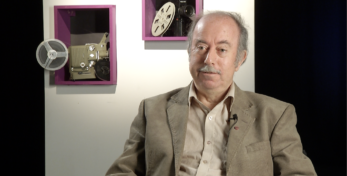I am devastated to share the news of Paul Welsh MBE’s passing.
Our project co-founder, and lead interviewer, Paul’s knowledge and range of friends in the industry were the very basis for the founding of The Elstree Project in 2010.
After having already filmed 10 interviews with Paul as expert interviewer, in 2011 we turned the cameras around and filmed Paul’s story and connection to the studios of Borehamwood so that his contribution would be recorded in his own words. Below, I would like to share stories from his life, which include his own words from this interview.
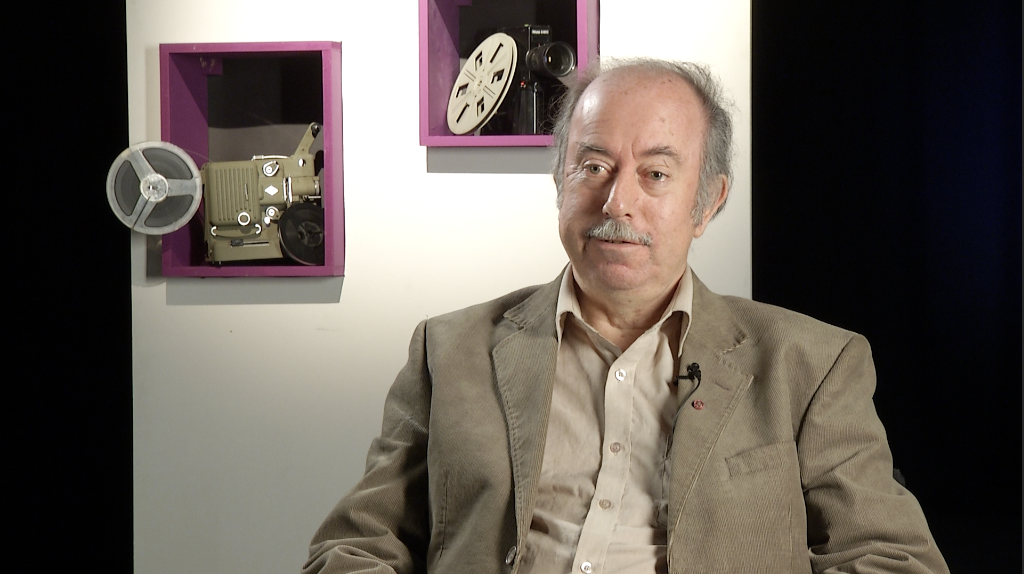
Paul’s father worked in the industry in Borehamwood, as a foley artist at the Gate Studios in 1956. He described how his father’s work encroached into the family’s home life:
As a kid, I used to find things disappearing from the house. So I was expecting Sunday lunch to include cabbage, and you’d find the cabbage disappeared, had a wooden stake driven through it, and then appeared in some Hammer Horror film, where Dracula has been pinned down! Or other different household products, different things would disappear. And you kind of grew up with that. It was an industry that dominated the town. I grew up in Borehamwood and it wasn’t unusual to have people, friends and neighbours who worked in the industry. And so I kind of just found a home in it in a sense.
Paul reminisced about his first visit to Elstree Studios, as a child, when he went to get the autograph of Gary Cooper. His father tried to convince him that the actor was “very famous”, but despite Paul thinking he was “just an old man” he went and got the autograph anyway. It turned out to be Cooper’s last film, and it instilled the importance in Paul to meet the stars in the locally made films before it was too late.
It was nothing to have your dad or your mum, or your brother or uncle, somebody, working in the industry. It was normal. You would find people filming around the town. Often when you were a kid there’d be exterior shots taken of some TV series or film. So again, it wasn’t a big thing to see it, or see a film star in the local pub when you were growing up. When you were a teenager or something if you found Trevor Howard or Robert Mitchum, or Elizabeth Taylor or Richard Burton, there was no big deal. People weren’t awed by that.
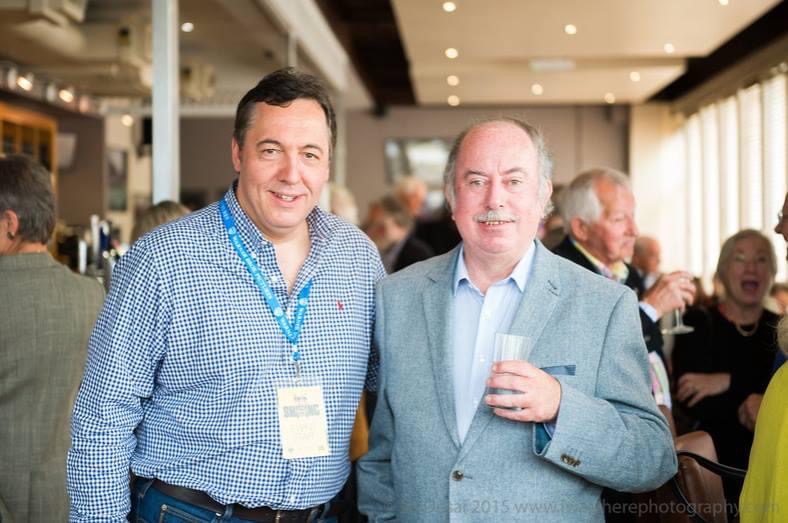
Later, in 1977, Paul was given a job as an officer of Elstree and Borehamwood Town Council, in charge of entertainments and events. With no property of its own to hold meetings, Paul initially worked at home. He was instrumental in the town’s annual festival becoming a huge two-day success for many years, as well as outings for senior citizens and spectacular Guy Fawkes night fireworks. As Elstree Studios had no staff member to help co-ordinate events, Andrew Mitchell — the managing director at the time — invited Paul to fill this position. This led to Paul writing a weekly column for the local newspaper.
Whenever they wanted special events organised or anything else, [Mitchell] just said, “Well, would you be interested in doing it?” So I kind of dropped into the showbiz element of the studios’ publicity and special events element. And because I was then meeting film stars and people, the local press said, “Well, will you write a weekly column?” So again, without any sort of journalistic training or qualifications, I suddenly found myself given a page a week to write about the goings on at Elstree Studios and elsewhere.
Paul’s column ended only earlier this year. He and I spoke about it last on the 15th August, in which we both we were certain that it must be a record for the same person to write a weekly newspaper column for 47 years.
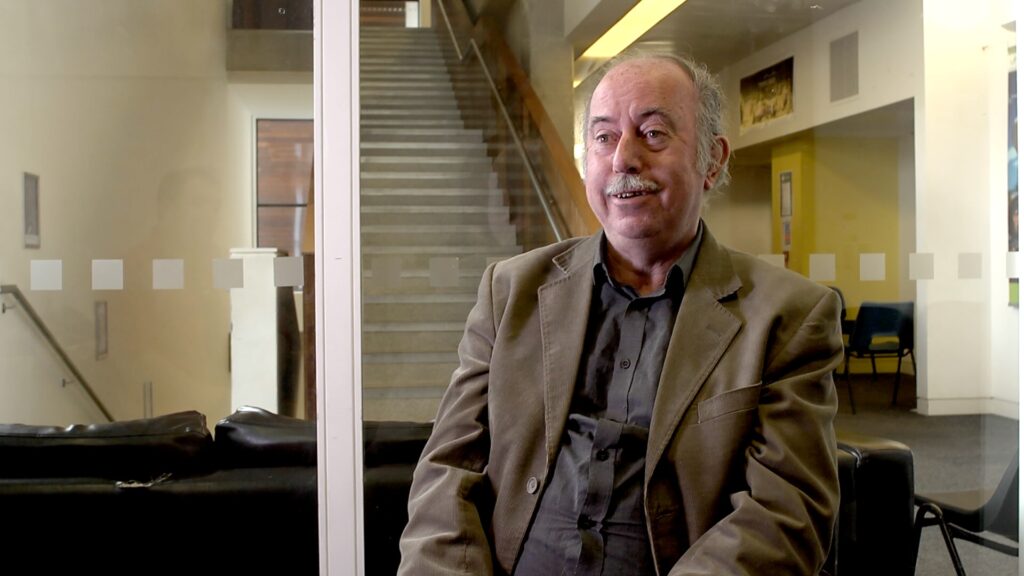
During the latter part of the 1980s, Elstree Studios’ owners ended up in financial difficulty. In 1986, owners (Thorn) EMI sold the studio to Cannon Films who were overextended financially. Cannon sold the studios to Brent Walker plc. and the company announced plans to demolish a portion of the site and sell to Tesco. A campaign group was set up which became the Save Our Studios campaign. Started with Pat Carr — production manager on Indiana Jones — Paul became Chairman and spokesperson for the group. He noted that the support of the local community was instrumental in the early stages, in which — within just a few weeks — they managed to get 20,000 signatures of support, and many celebrities to support them; resulting in Richard Attenborough becoming the President of the campaign.
Initially, the campaign had been against the sale by Cannon, but then it became to do with the Brent Walker era. And it dragged on for eight years. And at one point in 1993, Brent Walker actually closed the studio, and for three years, it stood, effectively semi-derelict. Everything was ripped out — literally kitchen sinks, carpet tiles — anything they could sell was ripped out. It was very dilapidated. Most people had written it off, thought it would never reopen. But I was chair of the campaign and I always felt that the battle is not lost until the last moment.
And we carried on with them, attacking them every corner we could. People like George Lucas and Steven Spielberg — I had a set meeting with them when they were doing Indiana Jones and Last Crusade and they agreed to be the patrons. And that meant immediately you had worldwide publicity, because you add Lucas and Spielberg into the mix and suddenly you find yourself being interviewed by crews from Argentina and Iceland, Germany and Australia and America and everywhere was interested in the fate of Elstree. That put a lot of pressure on the local politicians to keep the studios. And so it eventually went to court. It became very embarrassing for the banks to explain how they lent this money so recklessly to the company in the first place.
And Elstree was offered at a knockdown price to Hertsmere Borough Council, who thankfully at that point in time, had a lot of money in the bank from the sale of council houses. They took a gamble, bought it, and it’s since been refurbished and now it’s a great success.

Paul was recognised in 1997 with an MBE, awarded to him by the Queen and presented by (at that time) Prince Charles at Buckingham Palace. He had a particular memory of that moment, which is filled with his usual self-depreciating humour, but also displays his passion and entrepreneurship at work.
I think that year, they ran out of lollipop ladies, so they were looking around for people to give MBEs to. And so I was awarded the MBE, which was quite an interesting experience — going to Buckingham Palace and all the trappings that the ceremony entails, which I found easier to cope with because, when I had my cornflakes, I kind of liberally dosed them with vodka in the morning, so I was nicely chilled out when I went to the palace and other people were panicking around me.
But it was a fun occasion. And out of that came a bit of luck, because you have about a minute chat if you’re lucky, I guess with Prince Charles. And he’s obviously prompted just before you come on as to why you’re being given the award. And he knew about Elstree Studios because he had visited there before privately with his uncle, Lord Mountbatten, on the set of Murder on the Orient Express. And he asked me how things were going. And I explained that it was just reopened and so on so and said, “Would you be willing to come, come visit us at some point?” “Oh, a splendid idea that boy, love to do it.” And a couple years later, with the help the Lord Lieutenant of Hertfordshire, we were able to organise for him to come. So out of little acorns, the seeds grow. Seize the moment, seize the moment.
In 1996, the BFI decided to celebrate the centenary of cinema and announced 200 plaques would be placed around the country to commemorate historic events, people, landmarks and films in British cinema. Paul applied and achieved permission for 18 of those plaques, which was the highest number awarded to one single applicant in the whole country. The plaques celebrated not only Elstree Studios, but the whole studio industry in Borehamwood and Elstree — including MGM British Studios, the Elstree Centre, British and Dominions Imperial Studios, Gate Studios and Danziger’s New Elstree Studios. Later, many these plaques would be placed into boards which run the length of the high street in Borehamwood, with additional information about the honouree(s) as part of Paul’s chairmanship of Elstree Screen Heritage.
They represented six different studios that were based there, and various individual stars and directors who have been famous, and then it was my job to organise an unveiling ceremony relating to each one. If the recipient was still alive, such as John Mills, I would invite John to come and then Hayley Mills, his daughter, to do the unveiling. If the recipient was no longer with us like Vivian Lee, then I would ask somebody like Olivia de Havilland, who was her co-star from Gone With the Wind to do the task. With Peter Cushing, it was Christopher Lee.
Other honourees included Sir Roger Moore, Dame Barbara Windsor, Simon Cowell and Jim Henson.
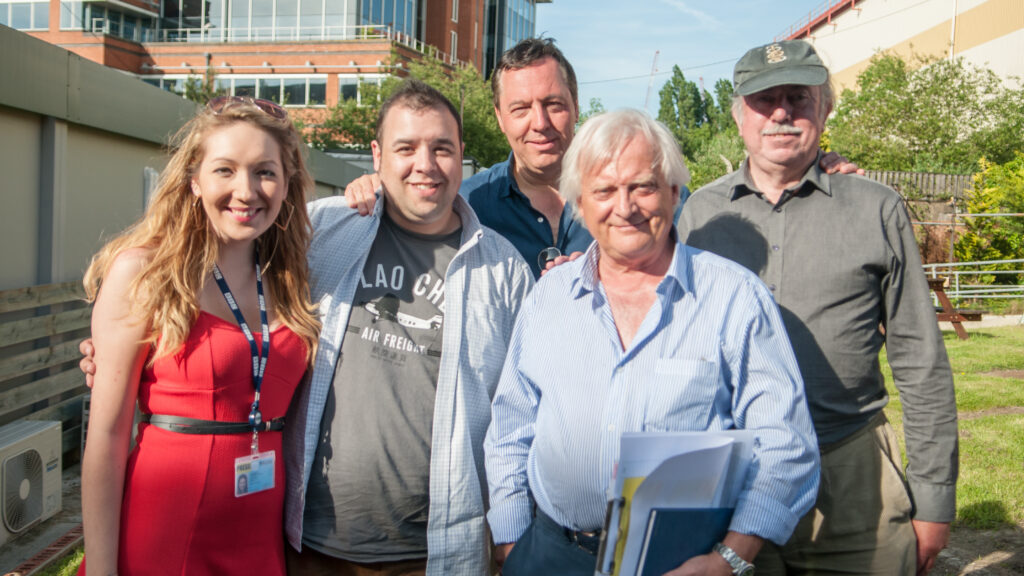
In March 2009 Paul decided to take “early retirement” from the council. It was in that same year that I came to meet and work with him. St Albans Museum had contacted the University of Hertfordshire about co-creating an exhibition on Stanley Kubrick. My colleague Dr Jayalakshmi and I, from the film department, became involved and we elected to begin an oral history with some of Kubrick’s family. Elstree Screen Heritage also came on board, and with Paul’s knowledge and history with the studios, we were able to include several crew members from Kubrick’s films in this initial round of interviews.
Once the exhibition had been completed, I was left in charge of the interviews at the University. I had enjoyed working with Paul so much, I proposed to him and Bob Redman (secretary of ESH), that we continue to film interviews. Initially thinking I meant on the subject of Kubrick, Paul wasn’t so sure he had more contacts, but when I said “no, the whole of Elstree and the studios”, he agreed this was a great idea. I had no clue how vast this history was or the scale of things, and so Paul was instrumental in being our guide. Initially called the Elstree Heritage Project, we renamed ourselves just simply “The Elstree Project”.
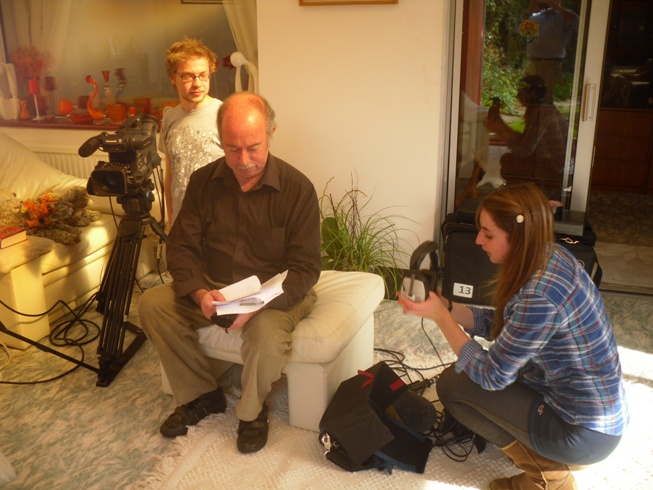
With Paul as interviewer, I produced and directed the recordings with student crew members from the Film and Television degree at the University. During the time we worked together, we filmed over 60 interviews. Many of these had clips edited and we screened them at a number of highly successful Elstree Film Seasons at the University’s Weston Auditorium — with Paul introducing each one with his usual dry humour, wit and vast knowledge. We were also fortunate, with Paul’s role as a trustee of the Borehamwood Museum, to include clips from our interviews on interactive iPad screens when the museum moved to the new community centre.
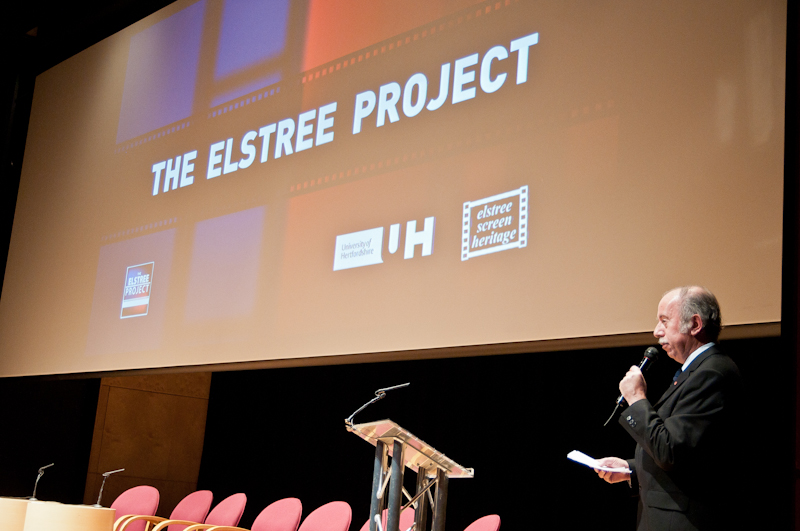
During the same period, Elstree Screen Heritage also organised or co-organised a number of events — including a night of movie memories at the Ark Theatre (now sadly demolished), and the launch of the First Impressions project with the council and railway which saw a number of stars unveiled in the pavement at the station forecourt, and the plaque for Barbara Windsor. It was great fun being on the bus to the station with both Barbara and Darth Vader. I was asked to film these events, and Paul and I often reminisced over how well he had thought they had gone, and how pleased he was to have a record for his memories.
In 2013, we were approached by Network Releasing to create a new documentary for the special features of their DVD release of Elstree Story. Naturally, Paul was host, and we filmed in the studio screening room to create new material to put the film in context and bring the history up to date.
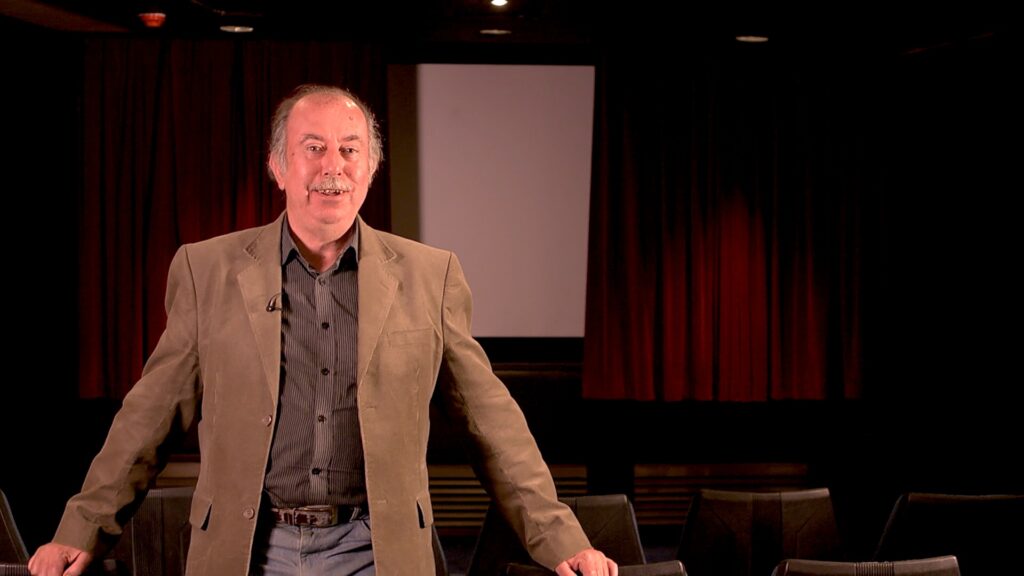
In the same year, I wrote a nomination for Paul to receive an honorary degree from the University. I was delighted when it was approved, and I know that Paul was particularly honoured on this occasion. He was never one to try and have the limelight, and often shunned it; but we were all delighted to see him recognised once more for his work as custodian of Borehamwood’s studio history.
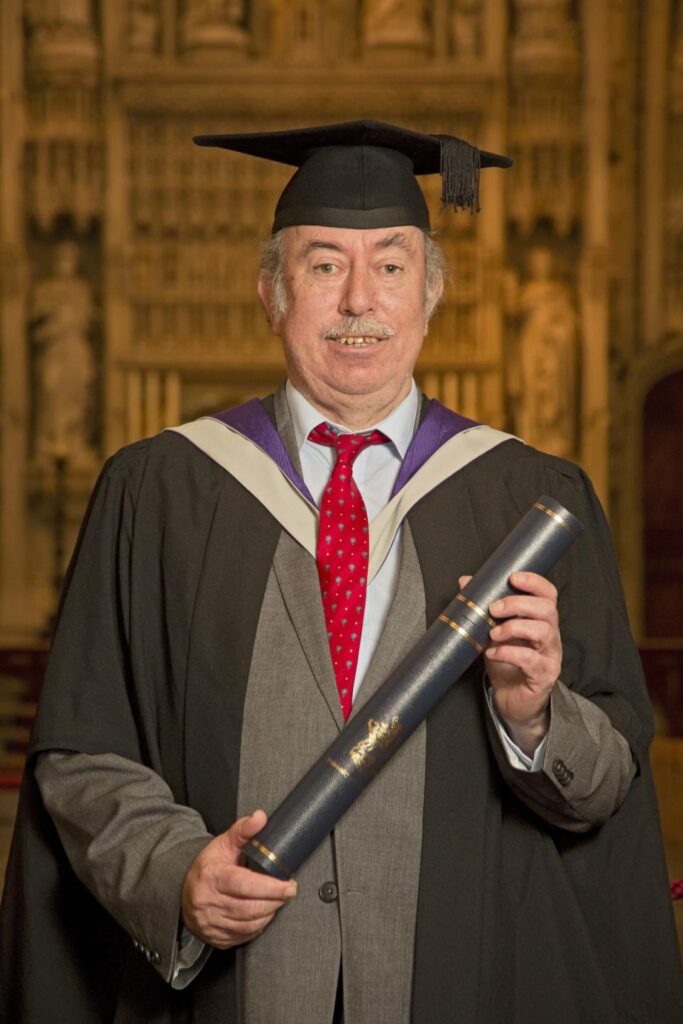
In 2014, we were at the centenary of the first studio to be built in Borehamwood — Neptune Studios, which is still in operation today as the Elstree Centre (owned by the BBC until earlier this year; now AXA). I made a special 100 minute long film, which combined extracts from our Elstree Project interviews, with new material hosted by both Barbara Windsor and Paul. From Borehamwood To Hollywood screened multiple times to sell out audiences in the new community centre in the high street, and the film was a huge success locally.
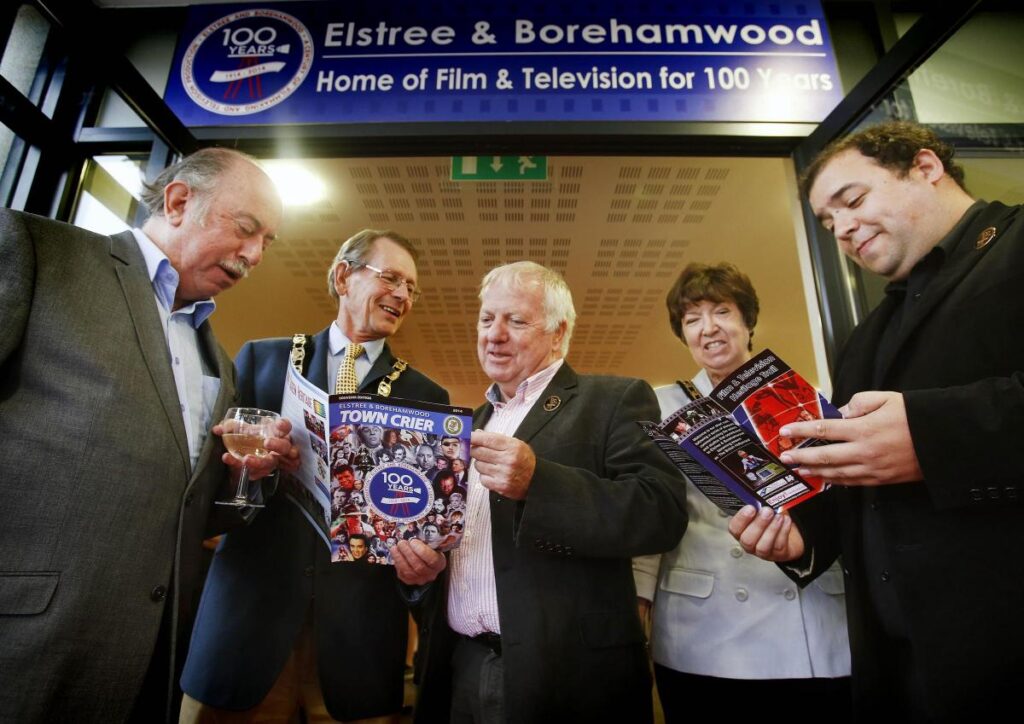
One of the two last events of which I was involved with Paul, was the studios’ own celebration of 60s and 70s television in 2017; which was an evening recognising the cult TV shows made at Elstree Studios — and celebrating special guest of honour Dame Diana Rigg. Paul was the host for the second half of the evening, which featured the BBC Elstree concert band playing music from the films, following an introduction to each piece by Paul himself. Paul had a very unique and self-depreciating sense of humour. Many times at events I remember him saying “I’m glad to be here… but at my age, I’m glad to be anywhere.”, which always got a good laugh. For this evening he was in splendid form, despite confessing his nerves about it to me beforehand. One particular highlight was his introduction of Superman IV: The Quest for Peace. Cheekily, Paul introduced it under its title, followed instantly by the words “a crap film”. The audience were in stitches and laughed so much he had to pause before the laughter died down and he could continue. It was naughty to say it… but he wasn’t wrong either!
Paul and I were last invited to Elstree Studios together to attend the opening of the Platinum Stages in June 2022. Paul and former Chairman of the studios, Morris Bright, asked me to film them as they approached the stages, and Paul saw them for the first time. Aware that this had only been possible due to the tireless campaigning Paul had begun in the 1980s, the moment was an important milestone for Paul — and an emotional one for the pair. Morris had interviewed Paul in the 1990s on his efforts to save the studios, and when he became Chairman of the studios, Morris promised Paul that he would fight to protect the studios and leave it in a better condition then when he found it. Twenty-two years later Paul reminded him of those words, and said “you kept your promise”.
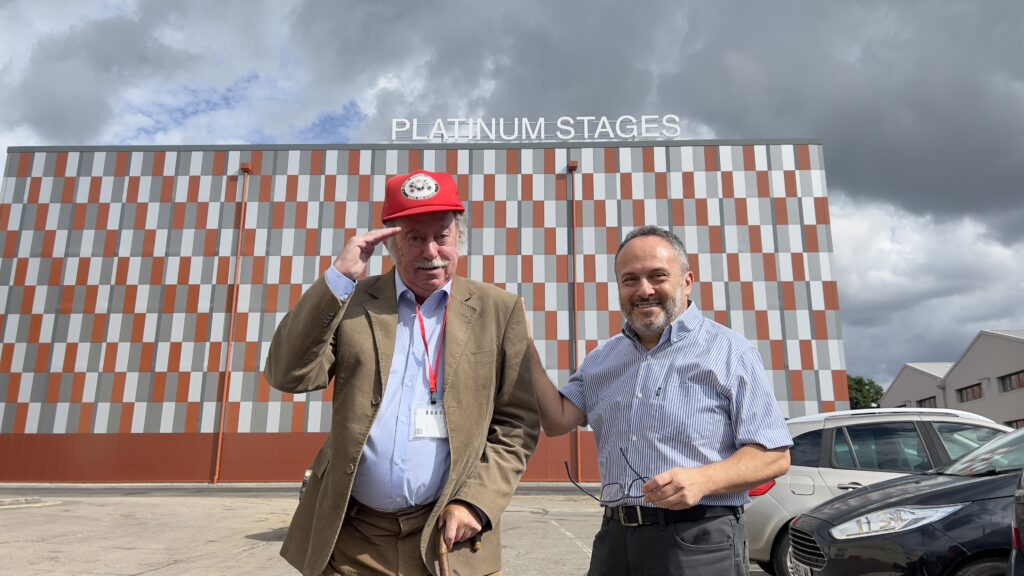
I last spoke to Paul just over two weeks ago. “How are you doing, kid?” he would say on the phone. He told me he was going to stop doing his column, and that he didn’t have much appetite any more; but he also enthusiastically discussed ideas with me about the centenary of Elstree Studios, which is next year. I wish he could have lived to see those plans come to fruition.
Paul Welsh was an author, historian, presenter, council worker, campaigner, columnist, interviewer and many other titles; and he was my friend and I shall miss him so very much.

